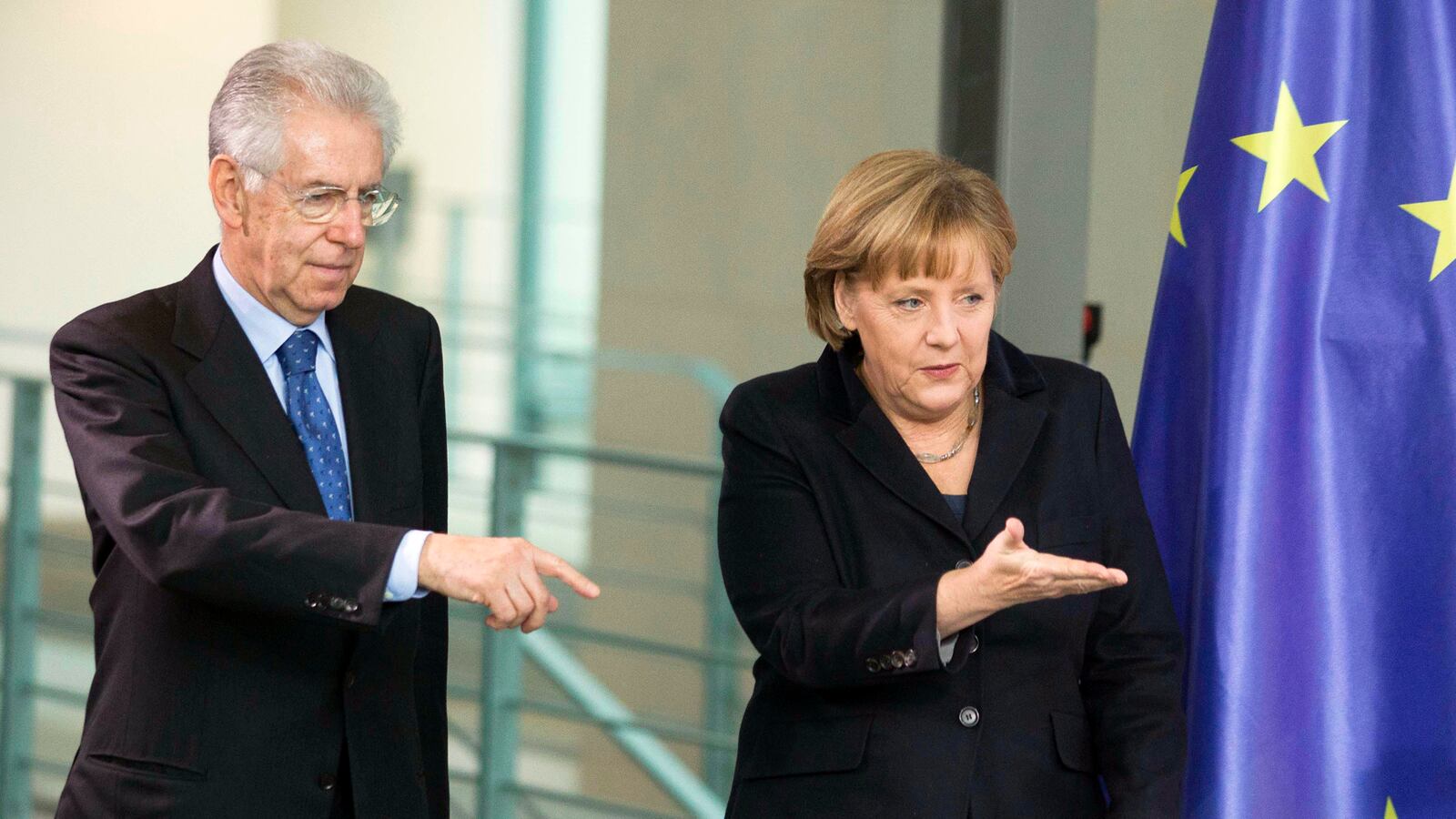Italy’s interim Prime Minister Mario Monti has the toughest job in Europe. As an unelected leader of an unwieldy, financially challenged nation that is largely seen as the next domino to fall in the euro zone, his role is as much that of an acrobat as an administrator as he walks a tightrope between foreign interests and homegrown discontent. Italians are angry. Morale is low. Austerity has left la dolce vita decidedly sour.
To his credit, the 69-year-old economist has already worked many miracles. Since taking over from Silvio Berlusconi, who was heckled out of office last October, Monti has managed to spiff up Italy’s image abroad and erase many of the stains of disgrace from the Berlusconi era. But in doing so, he has created disharmony at home among some Italians who increasingly feel like the country is under German control. On Tuesday, German Finance Minister Wolfgang Schaeuble told La Stampa newspaper that they approved of the Monti methods. "If Italy continues along Monti's path, there will be no risks," he said. But many Italian newspapers have planted the idea that Monti is merely a yes-man to German Chancellor Angela Merkel, detailing secret phone conversations and hinting that deals are being made between the two intellectuals.
Then on Wednesday, noted editorialist Roberto Napoletano urged Merkel to look beyond Germany’s bottom line and start considering the costs of austerity in the rest of Europe in personal terms. In an article entitled “Schnell, Frau Merkel” Napoletano wrote, “Ms. Merkel, you can’t go on like this. You will not go very far if you continue to be indifferent to the Greeks’ anger and distant from the Spaniards’ wounded pride, the Italians’ fears, the French’s anxieties.”
In regard to Italy, he is referring to an undercurrent of angst manifested in the visceral reactions on the ground, from a marked increase in suicides among entrepreneurs who can’t pay their employees or taxes to the brain drain that is beginning to feel more like a hemorrhage as Italians flee the country for jobs and stability—taking what little money they have with them. Italy is in its fourth recession since 2001 and nationwide unemployment topped 10 percent in April, the highest in 12 years. Italian consumer confidence is 95.2—hovering just above the country’s record low of 94 in 1993. New value-added taxes without equal spending cuts have angered consumers, who feel they are the only ones paying. Even a 2-cent gas tax meant to help the victims of the earthquake in Emilia-Romagna has left many Italians feeling bitter, especially considering that many parliamentarians are provided with expense-free cars as part of their jobs.

The lack of government spending cuts—especially among parliamentarians whose salaries and benefits remain among the highest in Europe despite massive cutbacks and job losses in other public sectors—has added fuel to the fire. It’s no wonder Beppe Grillo, a high-strung comedian turned grassroots politician, is fast becoming the most popular voice on the campaign trail with his “Five-Star Movement” and “Clean Up Parliament” mantra. Grillo has gained most of his votes from the traditional, now-disgruntled center-right faithful. A SWG poll after regional elections last month showed Grillo’s party as the second strongest after the center-left if elections were held now. “We have a political class of kleptomaniacs that needs to put back what it has stolen, from their bank accounts to their lofts, and then, because we don't want them sneaking off to the Seychelles, be put before a jury,” he said at a recent rally to wild cheers. Among his anti-establishment, anti-euro platform highlights are talking points like introducing a law that would prohibit parliamentarians convicted of corruption crimes from keeping their jobs. “Italy has a long way to climb up just to reach bottom,” he says. Grillo refers to Monti as “Rigor Montis.”
By most estimates, Monti has about three months to save Italy or send the country to the polls. That’s the time frame that IMF chief Christine Lagarde accidentally set in an interview with CNN’s Christiane Amanpour before clarifying that it wasn’t a “set term” but rather a strong guideline. “The construction of the euro zone has taken time,” she said. “And it's a work in construction at the moment. It must be improved, modified, and reinforced in the course of time. “
But the first test will come June 28, when European leaders meet at a European Council summit in Brussels to take a reading on the health of the euro. By then, Greece should have a government in place, and Spain’s banks should be back on their feet. Monti has insisted that Italy will not need a bailout like Portugal, Ireland, Greece, and Spain—known as the P.I.G.S. nations. Even though Italy’s $2.39 trillion debt is roughly 120 percent of the country’s GDP, Monti says its banking structure is far stronger than that of Spain and he says Italy’s reforms and austerity measures have had greater success than those in Greece. In an address to Italian Parliament Wednesday morning, Monti admitted “this is an intense and crucial phase for Europe.” He urged parliamentarians to remain united and cohesive to stay afloat. “Growth is our main worry,” he said, asking them to dismiss rumors in the Italian press that he was cutting a secret deal with Merkel. “The government is trying, with the support and the important backing of the Parliament, to be a leading actor not only at the summits but also in the consensus-building process from now until June 28 when partial steps will be made toward decisions." But whether those decisions are just another Band-Aid to temporarily extend the viability of the most vulnerable countries, or a true cure to actually fix the weak system without squeezing the life out of the financially distraught citizens in those countries, will determine the ailing euro’s real prognosis.





